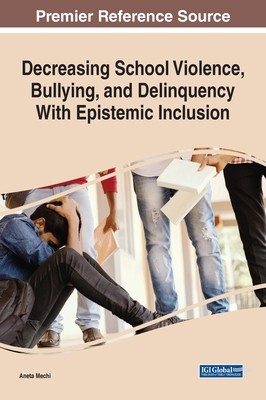
- We will send in 10–14 business days.
- Author: Aneta Mechi
- Publisher: Information Science Reference
- Year: 2020
- Pages: 300
- ISBN-10: 1799843661
- ISBN-13: 9781799843665
- Format: 17.8 x 25.4 x 1.8 cm, hardcover
- Language: English
- SAVE -10% with code: EXTRA
Decreasing School Violence, Bullying, and Delinquency With Epistemic Inclusion (e-book) (used book) | bookbook.eu
Reviews
Description
When asked what inclusion means, most people immediately think about relatedness: being accepted by a group or having the opportunity to belong. However, there are multiple needs for inclusivity that one goes in search of including self-integrity. If any stimuli threatens this integrity, a person may struggle to recover it, even if the price is to become the best gang leader, to follow the principle that it is better to be the leader of the dunces than to have the reputation of a "good for nothing." Individuals may suffer from unrecognition and thus avoid a situation in which they would be perceived as incompetent, especially when their potential has been previously ignored. This pain has often been accompanied by verbal aggression, violence, delinquency, or other criminal activities because of the need to show, at any cost, that they are skilled somewhere, even if it is a socially depreciated area. This theory has shown itself in school violence and students who partake in bullying, criminal acts, and delinquency. But giving individuals the opportunity to develop and display their competence keeps them related to pro-social behavior instead of pushing them to excel in anti-social settings. Decreasing School Violence, Bullying, and Delinquency With Epistemic Inclusion identifies which factors lead to prosocial behavior, why people start to behave antisocially, and how simple actions can change others' visions and goals in both positive and negative ways. This book employs the theory of epistemic inclusion in educational settings and how to increase it. Divided into four sections, this book covers the importance of finding a solution for violence, bullying, and delinquency; what epistemic inclusion is; how schools can make epistemic inclusion work; and implementing procedures. This book is a valuable reference tool for in-service and preservice teachers, administrators, psychologists, therapists, counselors, practitioners, researchers, academicians, and students interested in how the theory of epistemic inclusion can be implemented in educational settings.
EXTRA 10 % discount with code: EXTRA
The promotion ends in 20d.18:49:50
The discount code is valid when purchasing from 10 €. Discounts do not stack.
- Author: Aneta Mechi
- Publisher: Information Science Reference
- Year: 2020
- Pages: 300
- ISBN-10: 1799843661
- ISBN-13: 9781799843665
- Format: 17.8 x 25.4 x 1.8 cm, hardcover
- Language: English English
When asked what inclusion means, most people immediately think about relatedness: being accepted by a group or having the opportunity to belong. However, there are multiple needs for inclusivity that one goes in search of including self-integrity. If any stimuli threatens this integrity, a person may struggle to recover it, even if the price is to become the best gang leader, to follow the principle that it is better to be the leader of the dunces than to have the reputation of a "good for nothing." Individuals may suffer from unrecognition and thus avoid a situation in which they would be perceived as incompetent, especially when their potential has been previously ignored. This pain has often been accompanied by verbal aggression, violence, delinquency, or other criminal activities because of the need to show, at any cost, that they are skilled somewhere, even if it is a socially depreciated area. This theory has shown itself in school violence and students who partake in bullying, criminal acts, and delinquency. But giving individuals the opportunity to develop and display their competence keeps them related to pro-social behavior instead of pushing them to excel in anti-social settings. Decreasing School Violence, Bullying, and Delinquency With Epistemic Inclusion identifies which factors lead to prosocial behavior, why people start to behave antisocially, and how simple actions can change others' visions and goals in both positive and negative ways. This book employs the theory of epistemic inclusion in educational settings and how to increase it. Divided into four sections, this book covers the importance of finding a solution for violence, bullying, and delinquency; what epistemic inclusion is; how schools can make epistemic inclusion work; and implementing procedures. This book is a valuable reference tool for in-service and preservice teachers, administrators, psychologists, therapists, counselors, practitioners, researchers, academicians, and students interested in how the theory of epistemic inclusion can be implemented in educational settings.


Reviews